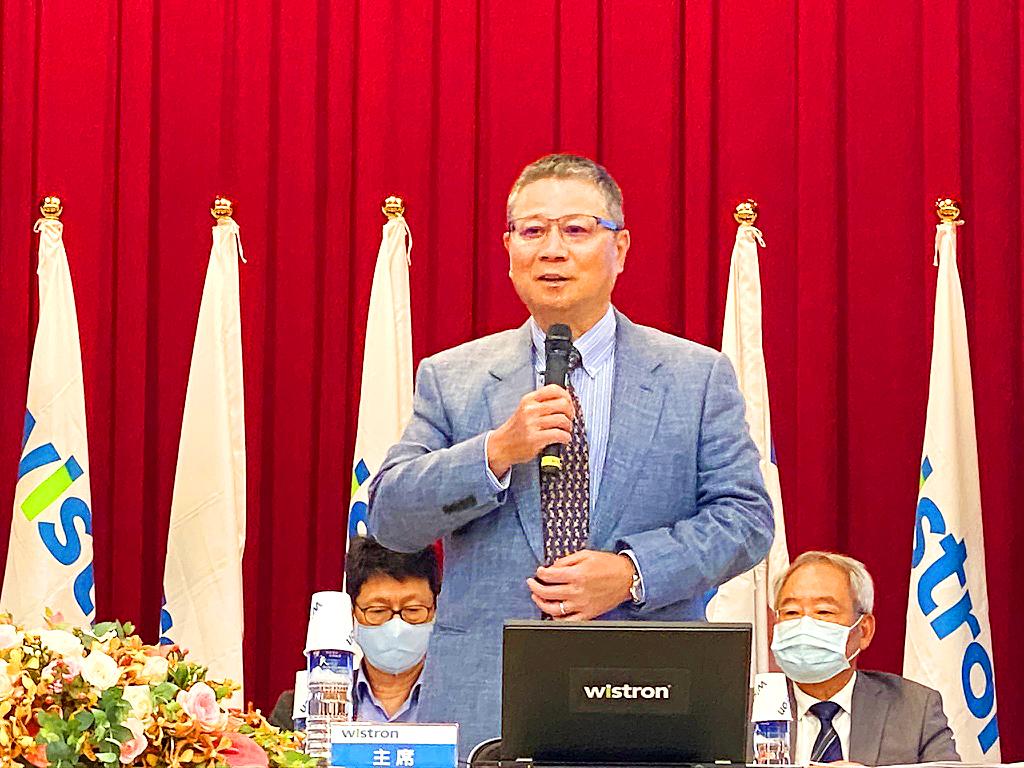Contract electronics maker Wistron Corp (緯創) is planning to expand production in Taiwan and Mexico this year as part of its global expansion.
The company expects to spend NT$16 billion (US$562.27 million) in capital expenditure this year, largely to be spent in Taiwan and Mexico, Wistron chairman Simon Lin (林憲銘) said at an investors’ conference on Wednesday.
Wistron’s global expansion plan is intended to reduce risks amid growing geopolitical tensions, Lin said.

Photo: CNA
Moreover, production diversification should allow the company to locate is facilities closer to international customers, he added.
In addition to Taiwan and Mexico, Wistron is considering investments in Vietnam later this year as part of its Southeast Asian development plans, Lin said.
China accounts for between 50 percent and 60 percent of Wistron’s production capacity, but that share is expected to fall as investment in Taiwan, Mexico and Vietnam rises, he said.
Capital expenditures for this year would also be put toward developing value-added products such as automotive electronics, servers and artificial intelligence devices, Lin said.
To meet funding demands, Wistron is selling up to 250 million shares in Taiwan or as global depositary receipts overseas.
Wistron on Wednesday said that net profit last year rose 20.6 percent year-on-year to NT$10.47 billion, or earnings per share of NT$3.76, while its consolidated sales totaled NT$862.08 billion, up 2 percent from a year earlier.
With the strong earnings, Wistron has proposed to issue a NT$2.2 cash dividend per share, suggesting a payout ratio of 58.51 percent.
Based on the closing price of Wistron shares at NT$29.6 yesterday, the dividend yield would be 7.43 percent.
Wistron president Jeff Lin (林建勳) said that the impact from a shortage of raw materials for notebook computer production had been eased to some extent from the previous year.
The company is to place a greater emphasis on commercial personal computers this year, with the expectation that shipments should rise 40 percent from last year, he said.
Separately, PC vendor Acer Inc (宏碁) on Wednesday said that its net profit last year was NT$10.897 billion, an 11-year high.
The 81 percent year-on-year increase was part of a rise in earnings per share to NT$3.63, compared with NT$2.01 in 2020, Acer said.
Consolidated sales totaled NT$319.01 billion, up 15.1 percent from 2020, with gross margin improving to 11.7 percent and net margin standing at 4.4 percent, the highest in the company’s history.
Given its strong showing last year, the company has proposed issuing a NT$2.28 cash dividend per share, representing a payout ratio of 62.81 percent.

AI SERVER DEMAND: ‘Overall industry demand continues to outpace supply and we are expanding capacity to meet it,’ the company’s chief executive officer said Hon Hai Precision Industry Co (鴻海精密) yesterday reported that net profit last quarter rose 27 percent from the same quarter last year on the back of demand for cloud services and high-performance computing products. Net profit surged to NT$44.36 billion (US$1.48 billion) from NT$35.04 billion a year earlier. On a quarterly basis, net profit grew 5 percent from NT$42.1 billion. Earnings per share expanded to NT$3.19 from NT$2.53 a year earlier and NT$3.03 in the first quarter. However, a sharp appreciation of the New Taiwan dollar since early May has weighed on the company’s performance, Hon Hai chief financial officer David Huang (黃德才)

The Taiwan Automation Intelligence and Robot Show, which is to be held from Wednesday to Saturday at the Taipei Nangang Exhibition Center, would showcase the latest in artificial intelligence (AI)-driven robotics and automation technologies, the organizer said yesterday. The event would highlight applications in smart manufacturing, as well as information and communications technology, the Taiwan Automation Intelligence and Robotics Association said. More than 1,000 companies are to display innovations in semiconductors, electromechanics, industrial automation and intelligent manufacturing, it said in a news release. Visitors can explore automated guided vehicles, 3D machine vision systems and AI-powered applications at the show, along

FORECAST: The greater computing power needed for emerging AI applications has driven higher demand for advanced semiconductors worldwide, TSMC said The government-supported Industrial Technology Research Institute (ITRI) has raised its forecast for this year’s growth in the output value of Taiwan’s semiconductor industry to above 22 percent on strong global demand for artificial intelligence (AI) applications. In its latest IEK Current Quarterly Model report, the institute said the local semiconductor industry would have output of NT$6.5 trillion (US$216.6 billion) this year, up 22.2 percent from a year earlier, an upward revision from a 19.1 percent increase estimate made in May. The strong showing of the local semiconductor industry largely reflected the stronger-than-expected performance of the integrated circuit (IC) manufacturing segment,

NVIDIA FACTOR: Shipments of AI servers powered by GB300 chips would undergo pilot runs this quarter, with small shipments possibly starting next quarter, it said Quanta Computer Inc (廣達), which supplies artificial intelligence (AI) servers powered by Nvidia Corp chips, yesterday said that AI servers are on track to account for 70 percent of its total server revenue this year, thanks to improved yield rates and a better learning curve for Nvidia’s GB300 chip-based servers. AI servers accounted for more than 60 percent of its total server revenue in the first half of this year, Quanta chief financial officer Elton Yang (楊俊烈) told an online conference. The company’s latest production learning curve of the AI servers powered by Nvidia’s GB200 chips has improved after overcoming key component